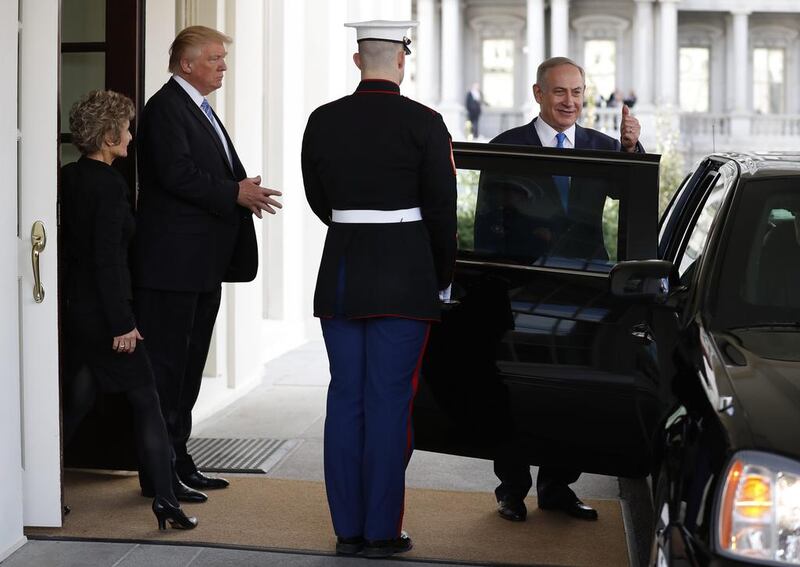JERUSALEM // On this there is agreement. Palestinian and Israeli analysts alike foresee dire consequences for everyone with Donald Trump’s apparent retreat from America’s commitment to a two-state solution.
“This is the first time that the US administration doesn’t insist on the two-state solution and gives the Israeli government the freedom to go to any solution it wants,” said Ashraf Ajrami, former minister for prisoner affairs in the Palestinian Authority. “It’s very dangerous and can lead to violence and confrontation and it means the situation of conflict won’t be solved in the near future.”
During a White House press conference with visiting Israeli prime minister Benjamin Netanyahu Trump was nonchalant about the policy that has been the cornerstone of US peace diplomacy, saying he could “live with” either a two-state or one-state solution.
“I thought for a while the two-state looked like it may be the easier of the two but honestly, if Bibi [Mr Netanyahu’s nickname] and if the Palestinians are happy, I’m happy with the one they like best.”
Mr Ajrami said this was tantamount to giving Israeli carte blanche to prevent a two-state solution and annexe the West Bank. He said Mr Trump’s posture could cause the Palestinian Authority to collapse. He also predicted a new intifada (uprising).
“Without hope, without a horizon, without seeing change, people will be very frustrated and disappointed and this leads to violence,” he said.
Alon Liel, the former director-general of the Israeli foreign ministry and a sharp critic of Mr Netanyahu’s policies, said Mr Trump’s pronouncement paves the way for Israel to annexe the West Bank in stages, leading to what will effectively be an apartheid state with a Jewish minority ruling over an Arab majority.
“When Trump says he leaves it to the Israelis and Palestinians to decide, it means that Israel, the strong party and occupier, can impose on the Palestinians almost anything it wants,” Mr Liel said. “If he says ‘you decide yourselves’ then it’s very clear where things are going. If I would trust Israel to give citizenship to the Palestinians of the West Bank at least it would stay democratic. But I don’t think Israel will give them citizenship. In other words, Trump is pushing Israel to be an apartheid state.”
Annexation of the West Bank would start with the large Maale Adumim settlement near Jerusalem and eventually encompass the 60 per cent of the West Bank that remained under full Israeli control after the 1993 Oslo agreement on Palestinian self-rule. If Mr Netanyahu did not comply, he would be removed by the majority in his coalition who favour this policy.
“In his first month in power, Trump has made a decision that will decide the fate of millions of people here without fully understanding the realities on the ground,” Mr Liel. “Though even if he understood it I don’t think he would care that much.”
Mkheimar Abu Sada, a political scientist at Al Azhar University in Gaza, said Mr Trump’s abandonment of the two-state solution placed the already unpopular Palestinian president Mahmoud Abbas in an untenable position. Mr Abbas has championed the policy since taking office in 2005. “This path of Abu Mazen [Mr Abbas] is going nowhere, it’s into the wall,” he sad. “If Abu Mazen were a western leader he would have to resign because the chances of going forward are nil.”
The Palestinians now need a new strategy, Mr Abu Sada added, whether striving for equal rights under one state, a mass campaign of non-violent resistance or dissolving the Palestinian Authority. “At least there needs to be discussion among political bodies and consultation with Arab friends like Jordan and Egypt. The political bodies will have to come up with an answer.”
foreign.desk@thenational.ae





